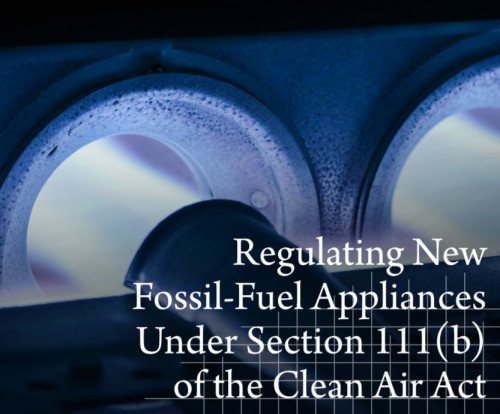-
Comments to DOE on Manufactured Housing Energy Conservation Standards
Policy Integrity submitted joint comments to the Department of Energy’s Supplemental Notice of Proposed Rulemaking for its Manufactured Housing Energy Conservation Standards. Our comments recommend that DOE provide additional rationale for applying the Working Group’s numbers, including by explaining why it is appropriate to focus on a global perspective of climate damages and exclude a 7% discount rate from its analysis of these damages.
-
Comments to Colorado PUC on Joining an RTO
Policy Integrity signed on to comments filed with the Colorado Public Utilities Commission (PUC) by Western Resource Advocates and the Western Grid Group. These comments sum up the key arguments presented in the long-running docket in which the PUC has considered questions about participation in a competitive wholesale market. The comments organize the points made in support of Colorado opting to join a new western Regional Transmission Organization (likely an expanded version of California's ISO+EIM) instead of joining SPP to the east or establishing its own Colorado-only RTO.
-
Comments to US Postal Service on Delivery Vehicle Acquisitions
The U.S. Postal Service committed to acquiring at least 10% battery electric vehicles (BEVs) over the next decade. We filed comments supporting that decision for monetizing the social cost of the project's marginal greenhouse gas emissions and describing several ways the Postal Service should extend its analysis.
-
Regulating New Fossil-Fuel Appliances Under Section 111(b) of the Clean Air Act
This report finds that EPA has authority under Section 111(b) of the Clean Air Act to set nationwide performance standards for new residential and commercial fossil-fuel appliances and that multiple means of reducing emissions from such appliances are adequately demonstrated, including the use of electric-heat-pump technology.
-
Comments to DOE on Conservation Standards for Furnaces and Water Heaters
In August 2021, DOE proposed to return to holding less-efficient gas furnaces to the same standard as other gas furnaces. We filed comments supporting the proposal, while cautioning DOE against making unnecessary statements that might hinder its ability in the future to set standards that would encourage consumers to switch from gas-fired appliances to electric appliances.
-
Comments to BLM on Big Papi Application to Drill
In the EA, BLM recycles the main Trump-era arguments that agencies used to justify their decision not to apply the social cost of greenhouse gases. In these comments, we draw BLM’s attention the proposed action's significant climate damages, amounting to between $114 million and $161 million over the lifetime of the planned wells.
-
Comments to BLM on Coal Leasing Program Review
In our comment letter, we call on the agency to substantially reform the coal program to adequately account for externalities and protect the public interest.
-
Comments to BLM on Oil and Gas Leasing in the Arctic National Wildlife Refuge
The Bureau of Land Management (BLM) recently issued a notice of intent to complete a Supplemental Environmental Impact Statement (EIS) for an oil and gas leasing plan within the Arctic National Wildlife Refuge (ANWR) Coastal Plain. We submitted comments explaining how BLM’s previous EIS fell short of the agency’s obligation to assess the effects of oil and gas leasing and to consider reasonable alternatives.
-
Shaping Virginia’s Energy Storage
Virginia recently adopted aggressive decarbonization legislation, which recognized that energy storage has an important role to play in decarbonizing the power sector. The Virginia Energy Storage Task Force (VESTF) was convened to help guide the deployment of energy storage resources. Senior Attorney Justin Gundlach served on the task force, and VESTF's final report drew extensively on Policy Integrity's research, including its reports on energy storage policy, valuing DERs, and DERs' emissions reduction potential.
-
Comments to FERC on Climate Risks, Reliability, and Resilience
The Federal Energy Regulatory Commission requested responses to a number of questions on the effects of climate change and electric system reliability. In April 2021, we submitted comments highlighting opportunities to improve reliability and resilience by adjusting approaches the Commission and others take to planning, investing in, and operating grid components.
Then FERC, following a technical conference over the summer, requested further comments on a specific series of questions. In September 2021, we submitted joint comments describing process options and resources for conducting climate resilience planning, and emphasized how accounting for climate impacts is relevant to consumer costs.







